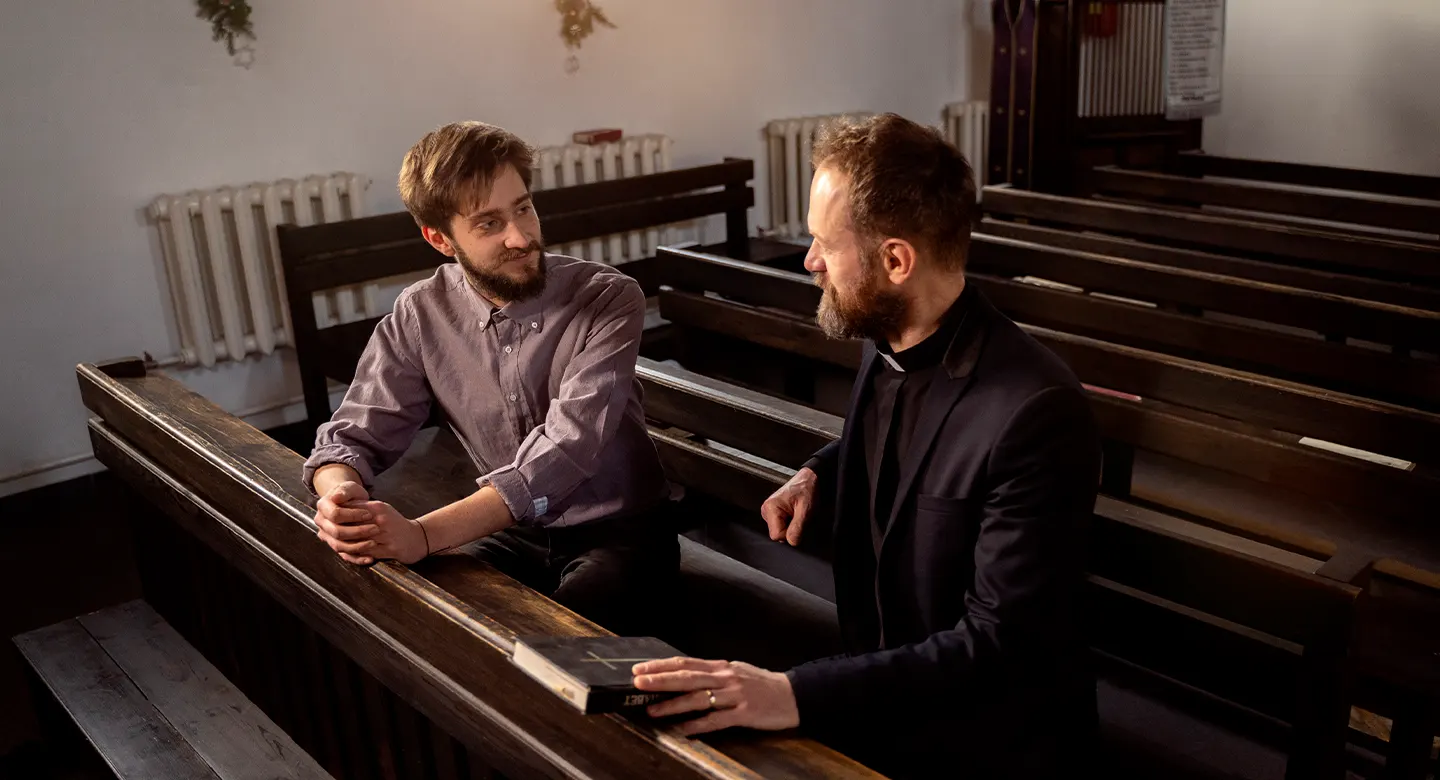Faith comes from listening, and listening comes through the message of Christ.
The crowd sought an explanation for the astonishing events in the upper room, prompting Peter, the leader of the disciples, to take the initiative. He fully surrendered to the Word of God, allowing its living and active power—sharper than any two-edged sword—to work profoundly in their hearts. The Words of God, not his own, resonated with the people, transforming them and inspiring them to take action.
- The Atmosphere of Expectation: As the crowd gathered, there was an electric sense of anticipation. People were eager to understand the miraculous signs they had witnessed, which created a fertile ground for Peter’s message to take root.
- The Role of the Holy Spirit: The Holy Spirit’s presence was undeniable, empowering Peter to speak with boldness and clarity. This divine influence amplified the impact of his words, ensuring they cut through the noise of doubt and skepticism.
- Transformation of Lives: The sheer number of conversions—three thousand in a single day—was a testament not only to Peter’s preaching but also to the transformative power of faith. Many in the crowd were drawn not just by words, but by the visible change in those who had already come to believe.
- A Call to Action: Peter’s sermons were not merely theological discourses; they were urgent calls to action. He urged the crowd to repent and embrace the message of Christ, igniting a movement that would forever alter the course of history.
That day, three thousand individuals came to faith in Christ after Peter delivered an impromptu sermon largely filled with Scripture quotes.
To further demonstrate that his first sermon was not a coincidence, Peter preached a second spontaneous message, quoting Genesis 22:18 and Deuteronomy 18:15, 18, while also referencing passages from Exodus 3 and Deuteronomy 18. He confidently shared these verses, having memorized them.
The priests, the captain of the guard, and the Sadducees listened intently, gripped by fear and astonishment at the power with which he spoke. The Word of God shook Jerusalem, leading thousands to respond to its influence. When the priests and guards arrested Peter and John, bringing them before the rulers, elders, and scribes, Peter again relied on Scripture to defend himself.

“Faith comes from listening, and listening comes through the message of Christ.”
Jesus is able to save to the uttermost. As John Newton once said, “That word ‘uttermost’ encompasses everything that can be expressed. Consider all our sins, temptations, difficulties, fears, and every form of backsliding—still, the word ‘uttermost’ surpasses them all.” It conveys both fullness and finality: Jesus saves completely and eternally.
This assurance is vital, especially when we confront the complexities and struggles of life. Each of us carries burdens that can feel insurmountable—past mistakes, moments of doubt, and fears about the future. The notion that Jesus can save to the uttermost offers us a profound sense of hope. It reminds us that no matter how far we may have wandered, there is a way back. The depth of His grace is unfathomable, reaching into the darkest corners of our hearts and illuminating them with His love.
- Total Acceptance: When we embrace the idea of being saved to the uttermost, we recognize that we are fully accepted by Christ. Our past, no matter how blemished, does not define our worth. This acceptance invites us to step into a new identity, one shaped by grace rather than guilt.
- Empowerment for Change: Understanding this complete salvation empowers us to pursue transformation. It encourages us to lay aside old habits and patterns that hinder our spiritual growth. The assurance that we are saved to the uttermost provides the confidence needed to strive for holiness and to become the people we are called to be.
- A Foundation for Community: This concept also fosters a sense of belonging within the body of Christ. When we recognize that everyone is equally in need of grace, we can create a more compassionate and supportive community. This shared understanding encourages us to walk alongside one another, helping each other navigate the challenges of faith and life.
- An Invitation to Trust: Ultimately, the phrase “to the uttermost” invites us to trust fully in Jesus. It calls us to relinquish our need to control every aspect of our lives, acknowledging that He is capable of handling our struggles. Trusting in His saving power allows us to experience peace, knowing that He is in control.
The reason He can save His people so fully and entirely is that “He always lives to make intercession for them” (Hebrews 7:25). In a world filled with constant danger, we have a Savior who is always praying for us. This ongoing intercession is not just a passive act; it is a powerful, dynamic engagement with our lives. Imagine the Creator of the universe actively standing before the Father on our behalf, advocating for us, shielding us from the weight of our sins and the consequences of our failures.

urthermore, the phrase “to the uttermost” speaks to the completeness of His saving work. It means that nothing is left out of His redemptive plan. Our struggles, pain, and even our triumphs are all enveloped within this promise. It invites us to bring everything to Him—our deepest fears and our greatest joys—and trust that He is not only aware but also intimately involved in our lives.
This profound understanding encourages us to develop a more robust prayer life. Knowing that Jesus intercedes for us invites us to lean into that relationship, to pray boldly and honestly, laying bare our souls before Him. It empowers us to approach the throne of grace with confidence, believing that we are heard and understood. Every prayer becomes an opportunity to experience His saving grace anew.
Additionally, the concept of being saved to the uttermost is not just about individual salvation; it encompasses the communal aspect of faith. As we embrace this truth, we become vessels of His grace to others. It compels us to extend that same comfort and hope to those around us, sharing the message that no one is beyond the reach of His love. Our testimonies of transformation can serve as beacons for others who are still searching for the light.
“Faith comes from listening, and listening comes through the message of Christ.”
These two powerful verses, Romans 3:23–24—one addressing sin and the other detailing God’s response—hold the key to becoming unshakable in a world filled with pain. According to Pastor John, these verses are “more important than ten thousand books written by man to help you solve your problems.” He emphasizes that if you build your life on these two verses and make them the foundation of your existence, you will find strength and stability in countless crises.
Verse 23 highlights the universal need shared by every human being, while verse 24 offers the all-sufficient solution to that need. These verses surpass the value of countless self-help books focused on problem-solving and improving your future. They convey the words of God through the apostle Paul, revealing our true condition and outlining what God has done to address it.
- Recognition of Our Condition: Understanding that “all have sinned” is the first step toward true healing and transformation. This recognition strips away the facade of self-righteousness and allows us to approach God with humility. It reminds us that everyone, regardless of their background or status, is in need of grace. This shared human condition fosters compassion and empathy, encouraging us to reach out to others rather than judge them.
- Embrace of God’s Grace: Verse 24 not only reveals our need but also showcases God’s profound grace. The phrase “justified freely by His grace” emphasizes that we cannot earn salvation; it is a gift given without condition. This powerful truth liberates us from the burdens of performance and perfectionism. When we embrace God’s grace, we open ourselves to experience peace and acceptance, knowing that we are loved unconditionally.
- Foundation for Transformation: Building our lives on these verses provides a solid foundation for personal growth. When we acknowledge our flaws and accept God’s grace, we are empowered to pursue transformation. This process encourages us to confront our struggles and weaknesses without fear. Knowing that we are justified through Christ enables us to strive for holiness while resting in His love and acceptance.
- Hope for the Future: These verses offer not just an understanding of our current state but also hope for what lies ahead. The assurance that we are justified by grace gives us confidence as we navigate life’s challenges. This hope propels us forward, encouraging us to live with purpose and intention, knowing that our future is secure in Christ. It reassures us that no matter the trials we face, we have a Savior who is actively involved in our lives.

In a world filled with uncertainty, these verses serve as a steadfast anchor. They remind us that, despite our flaws and failures, God’s response is one of grace and redemption. By grounding ourselves in these truths, we can weather any storm that comes our way. The clarity offered by Romans 3:23–24 empowers us to navigate life’s complexities with confidence, transforming our struggles into opportunities for growth and deeper faith. Ultimately, these verses illuminate the path toward an unshakable existence built on the unwavering foundation of God’s love and mercy.
“Faith comes from listening, and listening comes through the message of Christ.”
The crowd sought an explanation for the astonishing events in the upper room, prompting Peter, the leader of the disciples, to take the initiative. He fully surrendered to the Word of God, allowing its living and active power—sharper than any two-edged sword—to work profoundly in the hearts of the people. It was the Words of God, not Peter’s own, that spoke to the crowd and transformed them, piercing their hearts and inspiring them to take action.
- The Power of Testimony: Peter’s willingness to share his own testimony added a personal touch to his message. He was not merely reciting Scripture; he was living proof of the transformative power of Christ. His journey from doubt to faith resonated with the crowd, showing them that change is possible for everyone.
- Unity in the Message: The diverse background of the crowd—comprising various nations and cultures—highlights the universality of Peter’s message. By quoting the Hebrew Scriptures, he bridged the gap between Jewish traditions and the new faith emerging among the Gentiles. This unity in the message served to demonstrate that the Gospel is for all people, breaking down barriers and inviting everyone to respond.
On that day, three thousand individuals came to faith in Christ following Peter’s impromptu sermon, which was largely made up of Scripture quotes.
To demonstrate that his first sermon was no coincidence, Peter delivered a second spontaneous message, quoting Genesis 22:18 and Deuteronomy 18:15, 18, as well as referencing passages from Exodus 3 and Deuteronomy 18. He confidently quoted these verses, having committed them to memory.
- The Role of the Holy Spirit: The Holy Spirit played a crucial role in both Peter’s preparation and the crowd’s response. His empowerment allowed Peter to speak with authority and clarity. Simultaneously, the Spirit opened the hearts of the listeners, making them receptive to the truth. This divine partnership illustrates the necessity of relying on God’s Spirit when sharing the Gospel.
- Call to Action: Peter’s sermons were not just informational; they were urgent calls to action. He challenged the crowd to respond to the truth they heard, emphasizing the need for repentance and baptism. This call to action transformed the crowd from passive listeners into active participants in their faith, igniting a movement that would shape the early Church.

The priests, the captain of the guard, and the Sadducees listened to his words, gripped by fear and astonishment due to the power with which he spoke. The Word of God reverberated through Jerusalem, prompting thousands to respond to its impact. When the priests and guards arrested Peter and John, bringing them before the rulers, elders, and scribes, Peter again turned to Scripture to defend himself.
“Faith comes from listening, and listening comes through the message of Christ.”
The crowd sought an explanation for the astonishing events in the upper room, prompting Peter, the leader of the disciples, to take action. He fully committed himself to the Word of God, allowing its living and active power—sharper than any two-edged sword—to penetrate hearts. It was the Words of God, not Peter’s own, that resonated with the people and transformed them, piercing their hearts and inspiring them to act.
- A Model of Boldness: Peter’s willingness to speak boldly in the face of potential opposition exemplifies true courage. He did not shy away from proclaiming the Gospel, despite knowing the risks involved. This boldness serves as an inspiration for believers today, encouraging them to share their faith confidently, regardless of the circumstances.
- Collective Conviction: The atmosphere in the upper room and among the crowd was charged with collective conviction. Peter’s powerful delivery and the presence of the Holy Spirit created an environment ripe for transformation. This moment illustrates how communal faith experiences can catalyze individual commitments to Christ, showcasing the importance of gathering together to worship and learn.
On that day, three thousand individuals came to faith in Christ after Peter delivered an impromptu sermon largely filled with Scripture quotes.

- The Importance of Scripture: Peter’s reliance on Scripture underscores its central role in the life of a believer. His ability to recall and apply these verses effectively demonstrates the value of immersing oneself in God’s Word. For modern believers, this serves as a reminder to cultivate a deep familiarity with Scripture, enabling them to share the Gospel and defend their faith when the opportunity arises.
- Impact of a Transformed Life: The transformation in Peter, from a fearful disciple to a confident preacher, exemplifies the life-changing power of the Holy Spirit. His boldness and clarity captivated the audience, illustrating how a transformed life can powerfully impact others. This highlights the potential for each believer to become a witness for Christ, simply by allowing the Holy Spirit to work through them.
The priests, the captain of the guard, and the Sadducees listened to him speak and were filled with fear and astonishment at the power with which he delivered his message. The Word of God shook Jerusalem, prompting thousands to respond. When the priests and guards arrested Peter and John and brought them before the rulers, elders, and scribes, Peter again relied on Scripture to defend himself.
“Faith is gained through listening, and listening comes from the message of Christ.”
The crowd sought an explanation for the astonishing events in the upper room, prompting Peter, as the leader of the disciples, to step forward. He fully embraced the Word of God, allowing its living and active power—sharper than any two-edged sword—to penetrate hearts. It was the Words of God, not Peter’s own, that spoke to the people and transformed them, piercing their hearts and motivating them to take action.
- The Power of the Holy Spirit: Peter’s ability to speak so effectively was a direct result of the Holy Spirit’s empowerment. This moment illustrates the importance of relying on the Spirit for guidance and strength in our lives. For believers today, it serves as a reminder that when we step out in faith, we are not alone; we are equipped by the same Spirit who empowered Peter.
- A Testimony of Preparation: Peter’s confidence in quoting Scripture reflects his dedication to spiritual preparation. Memorizing and meditating on God’s Word is essential for any believer who wishes to share their faith effectively. This commitment to preparation allows us to respond thoughtfully and powerfully when opportunities arise.
- The Urgency of the Message: The urgency in Peter’s delivery resonates with the gravity of the situation. The presence of the Holy Spirit and the miraculous events of Pentecost demanded an immediate response from the crowd. This teaches us that the message of salvation is urgent and should compel us to act promptly in sharing our faith with others.
- The Influence of a Changed Life: Peter’s transformation from a fearful disciple to a bold preacher is a powerful testimony of the impact of faith. His boldness not only inspired those in the crowd but also struck fear into the hearts of religious leaders. This highlights how a genuine encounter with Christ can radically change an individual, enabling them to become a powerful witness and influence in their community.

When the priests and guards arrested Peter and John, bringing them before the rulers, elders, and scribes, Peter again turned to Scripture to defend himself.





